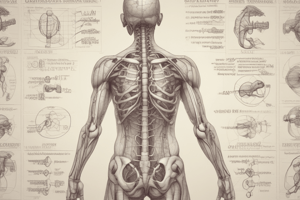Podcast
Questions and Answers
The study of anatomy and physiology provides:
The study of anatomy and physiology provides:
- The foundation for understanding all other basic life sciences
- An understanding of how your body works under normal and abnormal conditions
- A basis for making commonsense decisions about your own life
- All of the above are correct (correct)
Reading the textbook and memorizing important facts and concepts will assure you of success in the A&P course.
Reading the textbook and memorizing important facts and concepts will assure you of success in the A&P course.
False (B)
The study of internal and external body structures is:
The study of internal and external body structures is:
- Physiology
- Cytology
- Anatomy (correct)
- Histology
Physiology is the study of:
Physiology is the study of:
The four basic building blocks of medical terms are:
The four basic building blocks of medical terms are:
The worldwide official standard of anatomical vocabulary is:
The worldwide official standard of anatomical vocabulary is:
Anatomy and physiology are closely related because:
Anatomy and physiology are closely related because:
The study of general form and superficial anatomical markings is called:
The study of general form and superficial anatomical markings is called:
The anatomical specialty that provides a bridge between the realms of macroscopic anatomy and microscopic anatomy is:
The anatomical specialty that provides a bridge between the realms of macroscopic anatomy and microscopic anatomy is:
The specialized study that analyzes the structure of individual cells is:
The specialized study that analyzes the structure of individual cells is:
The scientist who studies the effects of diseases on organ or system functions would be classified as a:
The scientist who studies the effects of diseases on organ or system functions would be classified as a:
The smallest living units in the body are:
The smallest living units in the body are:
The level of organization that reflects the interactions between organ systems is the:
The level of organization that reflects the interactions between organ systems is the:
The two regulatory systems in the human body are the:
The two regulatory systems in the human body are the:
Homeostasis refers to:
Homeostasis refers to:
The ventral body cavity is divided by a flat muscular sheet called the _____
The ventral body cavity is divided by a flat muscular sheet called the _____
The heart and the lungs are located in the _____ cavity
The heart and the lungs are located in the _____ cavity
The two major subdivisions of the ventral body cavity are the _____
The two major subdivisions of the ventral body cavity are the _____
Making a sagittal section results in the separation of _____
Making a sagittal section results in the separation of _____
RLQ is an abbreviation used as a reference to designate a specific _____
RLQ is an abbreviation used as a reference to designate a specific _____
Moving from the wrist toward the elbow is an example of moving in an ___ direction
Moving from the wrist toward the elbow is an example of moving in an ___ direction
An erect body, with the feet together, eyes directed forward and the arms at the side of the body with the palms of the hands turned forward, represents the _____
An erect body, with the feet together, eyes directed forward and the arms at the side of the body with the palms of the hands turned forward, represents the _____
When an initial disturbance produces a response that exaggerates the disturbance, the mechanism is called _____
When an initial disturbance produces a response that exaggerates the disturbance, the mechanism is called _____
When a variation outside of normal limits triggers an automatic response that corrects the situation, the mechanism is called _____
When a variation outside of normal limits triggers an automatic response that corrects the situation, the mechanism is called _____
Flashcards
Importance of Anatomy and Physiology
Importance of Anatomy and Physiology
Essential for understanding life sciences and body function.
Anatomy vs. Physiology
Anatomy vs. Physiology
Anatomy studies structures; physiology studies functions.
Medical Terminology Components
Medical Terminology Components
Built from roots, prefixes, suffixes, and combining forms.
International Anatomical Terminology
International Anatomical Terminology
Signup and view all the flashcards
Role of Anatomy in Physiology
Role of Anatomy in Physiology
Signup and view all the flashcards
Surface Anatomy
Surface Anatomy
Signup and view all the flashcards
Developmental Anatomy
Developmental Anatomy
Signup and view all the flashcards
Cytology
Cytology
Signup and view all the flashcards
Histology
Histology
Signup and view all the flashcards
Levels of Organization
Levels of Organization
Signup and view all the flashcards
Regulatory Systems
Regulatory Systems
Signup and view all the flashcards
Homeostasis
Homeostasis
Signup and view all the flashcards
Positive Feedback
Positive Feedback
Signup and view all the flashcards
Negative Feedback
Negative Feedback
Signup and view all the flashcards
Ventral Body Cavity
Ventral Body Cavity
Signup and view all the flashcards
Anatomical Position
Anatomical Position
Signup and view all the flashcards
Proximal
Proximal
Signup and view all the flashcards
RLQ (Right Lower Quadrant)
RLQ (Right Lower Quadrant)
Signup and view all the flashcards
Sagittal Section
Sagittal Section
Signup and view all the flashcards
Abdominopelvic Cavity
Abdominopelvic Cavity
Signup and view all the flashcards
Thoracic Cavity
Thoracic Cavity
Signup and view all the flashcards
Anatomical Terminology
Anatomical Terminology
Signup and view all the flashcards
Function of Cells
Function of Cells
Signup and view all the flashcards
Interrelationship of Structures
Interrelationship of Structures
Signup and view all the flashcards
Study Notes
Foundations of Anatomy and Physiology
- Understanding anatomy and physiology is essential for grasping other life sciences and how the body functions in both normal and abnormal states.
- Knowledge in these fields enables informed life choices and health decisions.
Key Concepts in Anatomy and Physiology
- Memorization alone is not sufficient for success in anatomy and physiology courses; comprehension of concepts is crucial.
- Anatomy focuses on the study of internal and external body structures, while physiology emphasizes the functions of living organisms.
Medical Terminology
- Medical terms are built from word roots, prefixes, suffixes, and combining forms.
- The International Anatomical Terminology provides a standardized vocabulary for anatomy.
Interrelationship between Anatomy and Physiology
- Anatomy informs physiological functions; specific structures are related to specific functions.
- Physiological mechanisms can be understood only in the context of underlying anatomical structures.
Specializations in Anatomy
- Surface anatomy deals with the general form and superficial markings of the body.
- Developmental anatomy serves as a bridge between macroscopic and microscopic anatomy.
Cell Biology
- Cytology is the study of individual cell structures, while histology examines tissue structures.
- Cells are the smallest living units in the body, playing crucial roles in all biological processes.
Levels of Organization in the Body
- The organism is the highest level of biological organization, reflecting interactions between multiple organ systems.
Regulatory Systems
- The body is regulated by two systems: the nervous and endocrine systems, which coordinate physiological responses.
Homeostasis
- Homeostasis maintains a stable internal environment despite external changes; it is crucial for survival.
- Positive feedback mechanisms amplify disturbances, while negative feedback mechanisms correct deviations from normal.
Body Cavities and Anatomical Position
- The ventral body cavity is split into thoracic and abdominopelvic cavities, separated by the diaphragm.
- The anatomical position is characterized by an upright stance, feet together, arms at the sides, and palms facing forward.
Directional Terms
- The term "proximal" describes a position closer to the trunk (moving from wrist to elbow).
- The RLQ abbreviation indicates a specific quadrant of the abdominopelvic cavity.
Anatomical Sections
- A sagittal section divides the body into right and left halves, aiding in visualizing anatomical relationships.
Studying That Suits You
Use AI to generate personalized quizzes and flashcards to suit your learning preferences.
Description
Explore the essential concepts of anatomy and physiology that underpin the life sciences. This quiz will test your understanding of both the structures of the body and their functions, alongside the importance of medical terminology. Prepare to enhance your comprehension and make informed health decisions.





